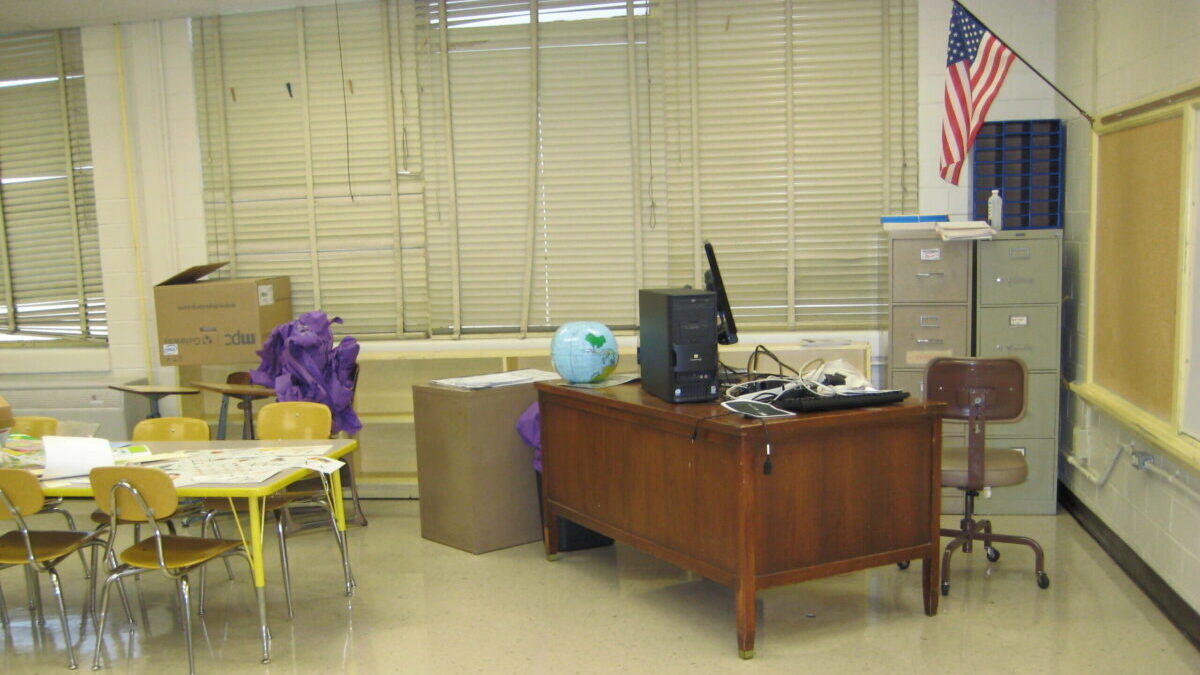In August 2022, the Kettle Moraine School Board in Wisconsin voted to prevent teachers and administrators from having political flags or religious messages in their classrooms. It’s time for other school districts across the country to do the same.
Federal government auditors from the Government Accountability Office are instructed not to display partisan or political messages in their office space or when they conduct audits in order to maintain their appearance of impartiality and professionalism — and GAO auditors work with adults. Why then would it be acceptable for public school teachers and administrators, who wield extraordinary influence over our children, to display overtly political messages in what should be an apolitical learning environment?
In fall 2021, I posed that question to our middle-school principal in Fairfax County, Virginia. Earlier that day, my son had casually mentioned that his engineering teacher displayed pride and Black Lives Matter flags in her classroom. After I expressed that, of course, all lives matter and everyone should have pride, I explained to my son that this is just one example of teachers trying to politically indoctrinate students.
The principal informed me that the school board had passed a policy in which flags of “marginalized groups” are welcome in the district’s classrooms. When I asked her how Black Lives Matter, a social movement, is a “marginalized group” given its $6 million mansion in California and tangential connection to many violent demonstrations across the country, she didn’t have an answer. But the whole issue raises the question: Who makes the decisions about what is acceptable to display and what is not? School boards themselves are intended to be apolitical, but they are heavily partisan.
Push Politics out of School
In fact, school boards and the schools themselves are increasingly bastions for leftist politics. For 2022, teachers unions (the National Education Association and the American Federation of Teachers) gave $1.3 million to Democrats and $2,500 to Republicans. In Virginia, NEA and AFT contributed $600,000 to Democratic candidate Terry McAuliffe in the 2021 governor’s race. AFT President Randi Weingarten even personally campaigned for him.
In Fairfax County Public Schools (FCPS), Democratic fervor is palpable in the school board and at the school level. All 12 FCPS board members were endorsed by the Democratic Party in 2019. Additionally, a quick walk through any of the county’s schools likely will reveal several Democratic candidates in bejeweled frames on teachers’ desks. In my family’s eight years with Fairfax County Public Schools, I have yet to see a Republican politician framed on a teacher or administrator’s desk. My friends who are Republican teachers or administrators keep their political views a closely guarded secret.
Good for them. While Republican teachers in Fairfax County are more likely to be reserved as a matter of job security, all teachers should keep their political biases from students as a matter of professionalism. This is not a speech restriction, but a professional necessity to push politics out of schools and wholeheartedly recommit to academic excellence. Long ago, public education had the mission of educating America’s children in math, science, reading, and fact-based history. Given plummeting standardized test scores across the nation, public education clearly has lost its way.
Violating the First Amendment
Public schools have transitioned from learning institutions to identity-affirmation daycare centers. For example, Fairfax County’s school board recently passed a policy to suspend students who “misgender” or “deadname” their peers — which is compelled speech, a clear violation of the First Amendment. The policy institutionalizes the idea that even though school personnel are forbidden from telling a student’s parents about any gender identity issues, the classmates of the student must fully be aware of everyone’s identity and participate in the affirmation process with the preferred pronouns. Gender identity currently receives the most attention, but the FCPS board is equally obsessed with students’ membership in any and all “marginalized” demographic groups.
At the meeting on July 14, 2022, for example, the FCPS board passed a motion directing the superintendent to develop a plan for the implementation of a bias incident system by December 2022. I emailed Abrar Omeish, who introduced this motion, asking her what motivated this, what it would entail, and how it would work. She didn’t respond. Another board member, Laura Jane Cohen, explained that this new system would scrutinize bullying or harassment incidents “to see if information can be further disaggregated to include how many incidents involve hate or bias.”
At the university level, in many identity-based bias-incident reporting systems, students report the incident themselves and the alleged “offender’s” reported bias can be either intended or unintended. In other words, this system is a completely subjective data collection scheme riddled with the biases of school board members — and is ripe to be weaponized against dissenting students. It has all the markings of an Orwellian thought police experiment.
Ironically, the real biases in schools are political and come from school boards, teachers unions, administrators, and teachers themselves. In order to alleviate the actual problem with biases (not simply “perceived” biases), we need to persuade school boards across the country to follow Kettle Moraine’s example.









